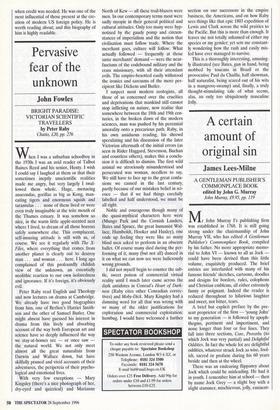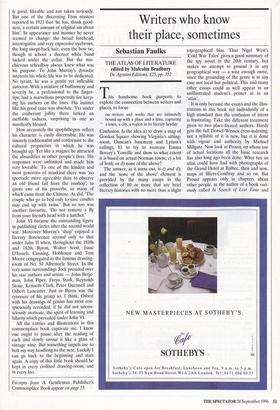A certain amount of original sin
James Lees-Milne
A GENTLEMAN PUBLISHER'S COMMONPLACE BOOK edited by John G. Murray John Murray, f9.95, pp. 119
Mr John Murray I's publishing firm was established in 1768. It is still going strong under the chairmanship of John Murray VII, who has edited A Gentleman Publisher's Commonplace Book, compiled by his father. No more appropriate memo- rial to John VI — known to all as Jock could have been devised than this little volume, exquisitely produced. The brief entries are interlarded with many of his famous friends' sketches, cartoons, doodles and designs for borders, rules, colophons and Christian emblems, all either extremely funny or poignant. Indeed the reader is reduced throughout to hilarious laughter and sweet, not bitter, tears.
A brief but explicit preface by the pre- sent proprietor of the firm — 'young John' to my generation — is followed by apoph- thegms, pertinent and impertinent, and none longer than four or five lines. They fall into three sections, Core, Proverbs (to which Jock was very partial) and Delightful Oddities. In fact the whole lot are delightful oddities, whatever struck Jock as wise, fool- ish, sacred or profane during his 60 years beside and then at the wheel.
There was an endearing flippancy about Jock which could be misleading. He had it in youth. I remember him at school — then by name Jock Grey — a slight boy with a slight stammer, mischievous, jolly, eminent- ly good, likeable and not taken seriously. But one of the discerning Eton masters reported in 1923 that he has, thank good- ness, a certain amount of original sin about him'. In appearance and manner he never seemed to change: the broad forehead, interrogative and very expressive eyebrows, the long swept-back hair, even the bow tie, though at school a discreet white band tucked under the collar. But the mis- chievous schoolboy always knew what was his purpose. To John Murray's dynastic interests his whole life was to be dedicated. No tyrant, he was a gentle yet inflexible autocrat. With a mixture of buffoonery and severity he, a professional to the finger- tips, had a marvellous propensity for keep- ing his authors on the lines. His instinct like his good taste was absolute. Yet under the exuberant jollity there lurked an ineffable sadness, surprising in one so manifestly blessed.
How accurately the apophthegms reflect his character is easily discernible. He was innately traditionalist and conformist to the cultural proprieties in which he was brought up. Yet like a magnet he attracted the absurdities in other people's lives. His responses were unlimited and made him very loveable. To one of the kindest and most generous of mankind there was `no spectacle more agreeable than to observe an old friend fall from the rooftop', to quote one of his proverbs, so many of which came from the Chinese. As did, 'The couple who go to bed only to save candles may end up with twins.' But so too was another favourite, 'Do not remove a fly from your friend's head with a hatchet.' John VI became the outstanding figure in publishing circles after the second world war. Moreover Murray's 'shop' enjoyed a literary florescence second only to that under John II when, throughout the 1810s and 1820s Byron, Walter Scott, Isaac D'Israeli, Canning, Hobhouse and Tom Moore congregated in the famous drawing- room of No. 50 Albemarle Street. In the very same surroundings Jock presided over his star authors and artists — John Betje- man, John Piper, Freya Stark, Reynolds Stone, Kenneth Clark, Peter Quennell and Osbert Lancaster. Just as Byron was the cynosure of his group so, I think, Osbert with his drawings of genius has most con- spicuously recorded, if he did not uncon- sciously motivate, the spirit of learning and hilarity which prevailed under John VI. All the entries and illustrations in this commonplace book captivate me. I know one ought to pause after the reading of each and slowly savour it like a glass of vintage wine. But something impels me to bolt my way headlong to the next. Luckily I can go back to the beginning and start again. A copy of this little book should be kept in every civilised drawing-room, and in every loo.
Excerpts from A Gentleman Publisher's Commonplace Book appear on page 55.



















































































 Previous page
Previous page